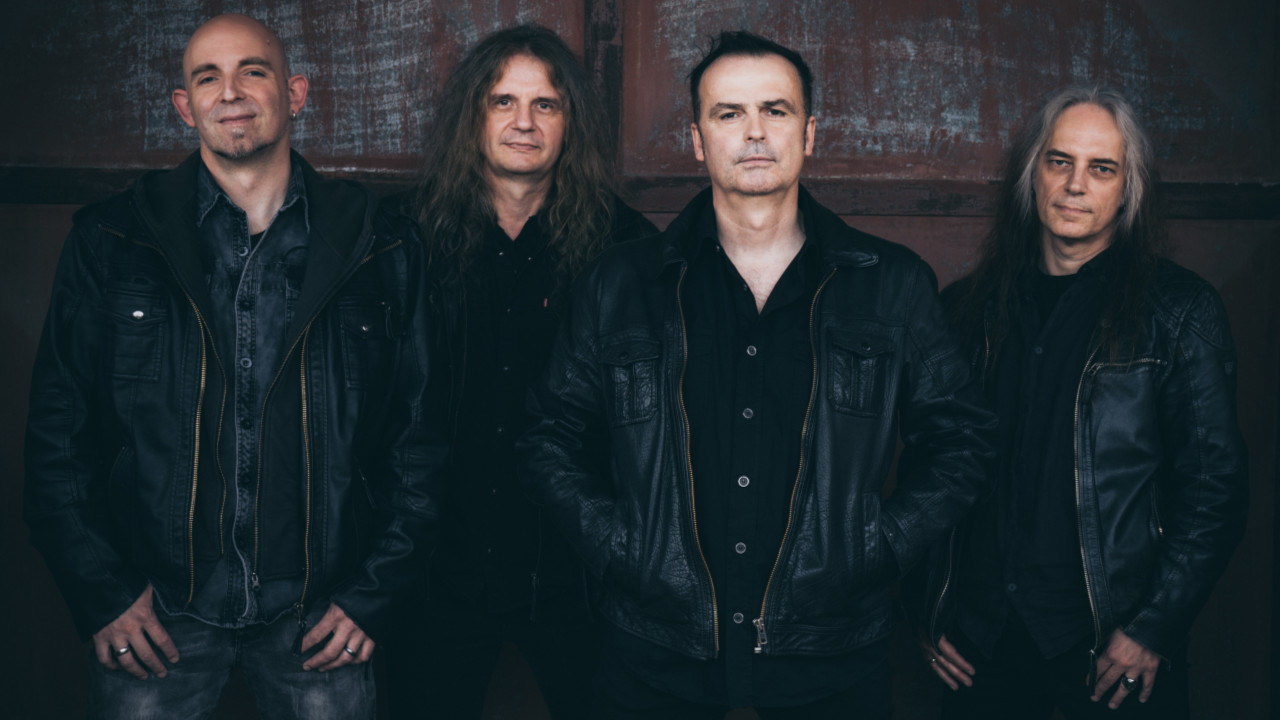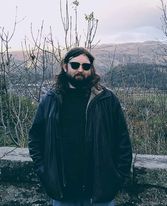Sitting on a boat on the river Rhine near Cologne in his native Germany, Hansi Kürsch looks at peace with the world as he basks in the glorious sunshine. His band, Blind Guardian, have just treated a small contingent of journalists to a playback of their upcoming 12th album, The God Machine – a blinding reimagining of the bombastic, straight-ahead power metal they championed throughout the 90s.
Their first full album in seven years (2019’s Legacy Of The Dark Lands was attributed to the ‘Blind Guardian Twilight Orchestra’), it may even be the heaviest record Blind Guardian have made since their epic 1995 breakthrough, Imaginations From The Other Side. But even as the beer flows readily and Hansi cracks jokes about how it feels to finally play international shows for the first time in almost five years, it soon becomes apparent that it’s been anything but smooth sailing for the singer.
“While writing the album, my mother passed away after a long period of suffering,” he says, and the easy smile on his face disappears. “Naturally, that has an impact on everything else, as does the fact I was referred to therapy to process it all. But you have to keep going; it becomes almost therapeutic, capturing some of the emotions I was going through. It was the same story when we did Somewhere Far Beyond – some of the pieces I wrote were inspired by my father passing away.”
Released 30 years apart, both Somewhere Far Beyond and The God Machine mark major stylistic turning points for Blind Guardian. Back in 1992, the band were still outliers in Germany’s thrash/speed metal scene, Somewhere Far Beyond was the point they fully embraced power metal and became one of the genre’s biggest champions.
“We knew we were not directly doing music in the direction of Kreator or Destruction, as much as we liked those bands,” Hansi admits. “When Helloween made Walls Of Jericho [in 1985], it opened up a whole bigger game. It didn’t matter if you made thrash metal, speed metal or black metal – it was all heavy metal.”
The God Machine sees Blind Guardian changing direction again. After working on 2019’s Legacy Of The Dark Lands with the Prague Philharmonic Orchestra, Hansi says he will be happy if he doesn’t see another orchestra “for the next 20 years”. The record took the symphonic inclinations they had introduced on 1998’s epic Nightfall In Middle-Earth to their natural conclusion.
It was an epic undertaking – a double album based on the character Solomon Kane, a creation of Conan The Barbarian mastermind Robert E. Howard - but also a colossal pain in the ass, as Hansi was the only member who performed on the album, meaning the others were left twiddling their thumbs.
“I was an alien in my own music,” the singer admits. “Classical music is composed in an entirely different way to metal. When I have those aggressive guitars, I can really cast myself into it and feed on the energy. An orchestra is this great organic beast and it takes a long time to master that, so it was a painful process.”
Even as they were developing Legacy Of The Dark Lands, Blind Guardian had begun writing songs for The God Machine. As such, the songs Architects Of Doom and Secrets Of The American Gods still bear the prog songwriting and orchestral flourishes of their more recent records. It was album opener Deliver Us From Evil that proved to be a real game changer.
“It really took off in the studio,” Hansi recalls. “We had a production meeting and everyone agreed – we wanted a ‘let your hair down’ album more than anything else. The God Machine is a new beginning for Blind Guardian.”
Hansi is both amiable and reserved, measuring his words carefully and deftly steering away from personal subjects. He declines to discuss his former side-project, Demons & Wizards, who split after guitarist Jon Schaffer was arrested for participating in the insurrection at the Capitol Building in Washington D.C. last year (“It’s an open case; I believe he deserves the right to express himself, to explain his side, and we wouldn’t want to interfere with that,” he says).
He speaks of his parents fondly, but doesn’t want to dwell on their passing, preferring to focus on their lives and the impact they had on him. “Both my parents had to struggle to survive in different ways,” he says. “They worked to feed their children. I know what it means to be poor and in desperate situations, but my parents never gave up and that fostered my personality.”
Born into a working class family, Hansi shared a room with his two sisters and brother “for at least 12 years of [my] life”, in the suburb of Lank-Latum, north of Dusseldorf. For someone who would grow up to sing about orcs and elves, the young Hansi was surprisingly athletic. Rather than burying his nose in fiction, he spent his days playing with his friends, though a little bit of fairytale magic crept in. “I played football in the shadow of a castle and there was a 1,000-year-old wall just opposite my house,” he says. “It all helped increase my raging imagination!”
From the sprawling Black Forest (the setting of many of the fairytales by the Brothers Grimm) to the innumerable castles dotted throughout the countryside (including Neuschwanstein, the basis for Disney’s Sleeping Beauty castle), Hansi was acutely aware that Germany was the land of fairytales. So it was almost inevitable that he would grow to love the fantasy genre, which carried over into his music.
While Blind Guardian aren’t renowned for soul-searching lyrics and candid confessional songs, ardent fans will point out their capacity for exploring complicated topics and emotions through a high fantasy filter. To wit, fan-favourite Valhalla isn’t a song about Vikings and epic battles – it’s a song wherein the narrator muses on the demise of his culture (the fact that said narrator is a wizard is neither here nor there).
Similarly, Let It Be No More on Blind Guardian’s new record contends with the conflicting emotions arising from Hansi’s mother’s passing, albeit through a narrative inspired by Tom Perrotta’s The Leftovers, a novel about life on Earth after a rapture-like event.
“The story deals with the idea of who is really left behind – is it the ones who pass on, or the ones who stay?” Hansi says. “But Let It Be No More was actually written by André [Olbrich, guitars]. He was there and could focus on what I was going through, when my mother was not in the best condition.”
While grief has doubtlessly fed into the creation of The God Machine, Hansi doesn’t see the album as being inherently darker than any of Blind Guardian’s other releases. Rather, he sees The God Machine as a much-needed stylistic and emotional cleanse for the band, while maintaining their fantastical elements.
Inspirations behind songs range from Arthur Miller play The Crucible, to Patrick Rothfuss's (as-yet incomplete) trilogy The Kingkiller Chronicle, and Neil Gaiman novel American Gods.
“I still try to build a glimpse of hope into even the darkest song,” he admits. “Whatever happens in our lives, we can’t exclude that in our songwriting. But going through a depressive episode doesn’t necessarily mean you make darker music.”
Clocking in at 51 minutes, The God Machine represents the heaviest, most direct record Blind Guardian have made in decades. Boasting the incisive speed of their early years, the bombast of their 90s breakthrough, and the epic songwriting of their recent releases (including a few orchestral elements – clearly a hard habit to break), it feels like the most comprehensive statement of Blind Guardian’s career to date.
For all the similarities surrounding the creation of Somewhere Far Beyond and The God Machine, Hansi acknowledges that he was a different person 30 years ago. The way he makes music – and processes grief – has changed immeasurably, and for the better.
“When my father died, there was a lot of growing up involved,” he says. “Back then, when I had a problem it was like I would be smashing my head against a brick wall until I made it through, rather than looking for the door. Now if I run into the same wall, I get back up and look for that door."
The God Machine is out now via Nuclear Blast


